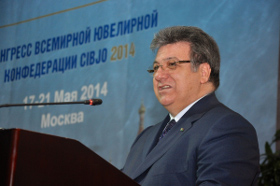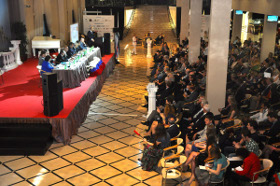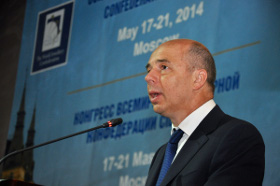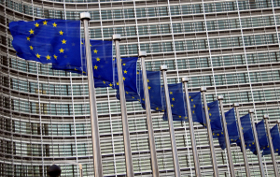Full text of CIBJO President’s speech to 2014 CIBJO Congress
“CIBJO gets its mandate from its members, which for the most part are national associations representing the very grass roots if the industry in their respective countries,” said CIBJO President Gaetano Cavalieri, in his opening address to the CIBJO Congress. “We are open to the participation of all relevant people and companies, be they large or small, and our mission is to defend their interests and also the interests of our consumers, without whose trust none of us could survive.”
The following is the full text of his address to the Congress:
Welcome to Russia and welcome to Moscow.
For many of us in this room, less than 25 years ago the very concept of us gathering together in this location together, here in Moscow, would have seemed almost impossible.
I, and many of you, were born into world that was separated by walls and borders that few could cross, where communication was difficult and where the opportunity of knowing, working together and doing business with people on the other side was extremely limited.
But, when the barriers that separated East from West came crashing down at the end of the 1980s, many of our misconceptions about our counterparts on the opposite side fell away at the same time. And what we discovered was that, not only is the love of jewellery universal, for us in the jewellery business it is a common language. Indeed, if CIBJO has got anything to do with it, it is language with a common vocabulary, or nomenclature, and a common grammar.
This is an unusual setting for a CIBJO Congress, but a most appropriate one. As many of you already know, we are seated above one of the largest jewellery manufacturing facilities in the world. In so many ways can be a considered a symbol of the new Russia.
The Russian jewellery tradition, of course, did not begin with the end of the Cold War. It has an illustrious history dating back many hundreds of years, and was developed not only as part of this nation’s cultural and artistic tradition, but also because it is blessed by an incredible array of natural wealth, ranging from gold, palladium and silver, diamond deposits and a rich variety of coloured gemstones.
But over the course of the past 20 years the Russian jewellery industry has flourished, drawing on its long history and tradition, while at the same time releasing a spirit of creativity and entrepreneurship. The results of this rebirth can be found in the display cases around us, and in the women and men who work each day in the floors of the facility below us.
The gentleman who is a responsible for creating this massive enterprise, in an impressively short period of time, is also the Chairman of the Russian Jewellery Guild, our host in Moscow over the coming three days. I would like to pay tribute to Gagik Gevorkyan and to thank him and his staff for their hard work and hospitality. We are most grateful.
In particular, I would like to thank Artak Udumyan, who has coordinated the organisation of this congress, and who has worked closely with us over the past year to make it possible. With him is a whole team of managers, workers and volunteers, some of whom you may have met, but many who have worked and continue to work behind the scenes. I thank all of you.
Russia is one of the BRICS country, that club of nations that is driving the growth not only the luxury product industries, but of the world economy in general. We do not always know the venue of our next congress, but this time we do, and it will be another of the BRICS, Brazil in South America, and more specifically the city of Salvador in the State of Bahia.
We have a large delegation from Brazil with us in Moscow today, who are no doubt studying closely. Among them is Mr. Rafael Valverde, Superintendent of Industry and Minerals of the State of Bahia, and the personal representative of His Excellency Jaques Wagner, Governor of the State of Bahia. Also present is Mr Hecliton Santini Henriques, President of IBGM, who will be our host in Brazil next year, and Karina Sena, President of the Bahia association of jewellery precious gems and metals.
We have a very tight programme this morning and my intention is to keep my remarks briefs. It is important, however, that I emphasise the role of CIBJO in the world industry today and, in particular, our obligation to represent the interests of all participants and stakeholders in our industry, at all levels of the chain of distribution and in all geographic locations.
CIBJO gets its mandate from its members, which for the most part are national associations representing the very grass roots if the industry in their respective countries. We are open to the participation of all relevant people and companies, be they large or small, and our mission is to defend their interests and also the interests of our consumers, without whose trust none of us could survive.
Ours is an industry that traditionally has been comprised of predominantly smaller companies, many of which are family owned. CIBJO provides them a forum where they can rally together, and draw strength from one another as a community with similar attributes and challenges.
In the jewellery industry, like in other business sectors, the position of the smaller and medium sized enterprise has eroded in recent years. One may argue that this is result of economic forces, created by a market that is becoming globalised, where economies of scale are always increasing.
That may be, but what may be more acceptable in other, more heavily industrialised business sectors is not always appropriate for jewellery, where the principles of individualism and personal creativity are so critically important.
CIBJO not only insists, but will do all that it can to ensure that the playing field in the jewellery sector remains level for all participants, be they large or small. We cannot accept a situation where the conditions for entry are artificially manipulated so that the cost of participation is restrictively expensive.
Our commitment to responsible business practices and Corporate Social Responsibility is absolute, and we insist that they be applied and implemented by all individuals and companies that are active in our business. But we refuse to accept a situation by which ethical and upstanding members of our trade are unable to compete fairly because that they cannot afford or are structurally unable to implement the systems that are imposed upon them.
There is a growing tendency of players in our industry, sometimes private companies, to lobby government and other international organisations to enact legislation or regulations that say are intended to protect the chain of distribution. These players represent themselves — not the industry as a whole and certainly not the international business. That is the role of elected representatives, like the national organisations and by association CIBJO.
It has been reported in the international press that a side meeting will shortly be taking place in just a few days in Paris, where certain industry members, mainly large companies, will be discussing how the jewellery industry could contribute to establishing new OECD due diligence guidelines on precious stones. I would like to stress that CIBJO, as the leading representative of national associations from our industry around the world, should have been consulted. We were not. Neither were the African producing countries or Russia, which together represent almost 90 percent of world diamond production.
Let me stress, we do not have a problem with companies acting in their own interest, but do we have a problem when it is in conflict with the general interest, which is the one that in the jewellery industry we democratically and legitimately represent, and in the diamond producing industry the African mining countries and Russia legitimately represents.
Although we understand and sympathise with the rationale of conflict mineral initiatives, the effects of poorly conceived legislation or regulations can be devastating.
For example, one of the consequences of the conflict minerals clause in the Dodd-Frank Act in the United States is companies avoiding legitimate gold producers in the Great Lakes region of Africa.
They avoid them because they because there are alternatives sources of supply, which are less cumbersome when it comes to Dodd-Frank compliance.
Let me stress, those who are paying the steepest price for the ill-conceived legislation are not the jewellers, but the stakeholders. And they are people and entire communities living in some of the most economically under-developed areas of Africa.
We certainly do not suggest that anyone does not comply with national law, but there are also humanitarian concerns, which is something that, we, as an organisation with special United Nations status, is very aware of. We have committed to the UN development programme and that means that nobody can be left behind.
CIBJO has a voice, and it can and has been heard. In Europe, for example, where there is a legislative effort underway to parallel Dodd-Frank, CIBJO’s EU Committee has had discussions in Brussels with the European Commission, and it appears that the law that will be passed by the European Parliament will have fewer unintended consequences than the one that was passed in the United States.
We have a few days of intense discussions ahead of us, but as we have shown in the past the significance of what happens here can be critical to the future of our industry.
On the agenda is range of topics, including those that I have discussed, but there also os synthetic diamonds and their effect on the market, jewellery advertising standards, our industry’s carbon footprint, the different CIBJO Books and many more.
May our deliberations be in-depth, meaningful and transparent.





